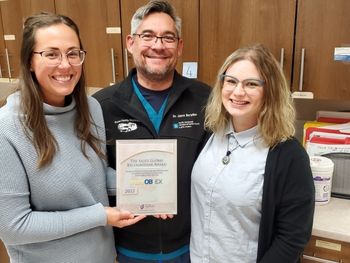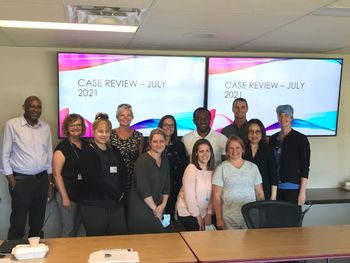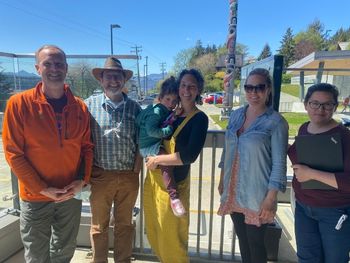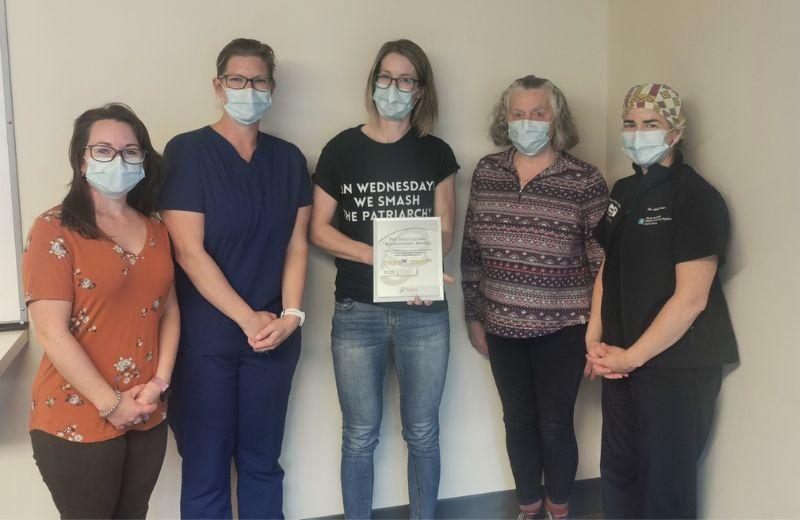Vanessa Salmons, Northern Health executive lead for the perinatal program and clinical programs, and Carolynn Russell, care coordinator with Salus Global, are celebrating the exceptional work of the four Northern Health (NH) sites that have participated in the Salus Global Managing Obstetrical Risk Efficiently (moreOB) program!

NH has been working with moreOB for almost 17 years and supports 11 planned delivery sites across the region. Four of our teams in NH have been recognized this year for their continuous quality improvement efforts: Terrace, Smithers, Quesnel and Daajing Giids, on Haida Gwaii! Last year, Dawson Creek, Vanderhoof, Smithers, and Quesnel were recognized for the work that they are consistently doing for their teams and patients.
The teams have been recognized based on several criteria:
- Core team effectiveness and function
- Leadership support and involvement
- Effective, high-quality communication
- The engagement and involvement of all professions
- Application to practice
Carolynn describes the moreOB program as “a comprehensive performance improvement program that promotes a culture of patient safety in obstetrical units.” That is, the program works with maternity and birth departments to help them best help and support their patients.
The moreOB program does this by partnering with health authorities to work with medical leadership to offer tools, education, mentorship, collaborative learning, and support for multidisciplinary teams (consisting of doctors, midwives, nurses, and more). The teams work on quality improvement projects to build on their knowledge and skills, and learn new techniques and practices. Much of the time, these projects are location specific.

The moreOB program:
- Helps to build evidence-based practice and a harmonization of care
- Provides interactive, hands-on workshops, and simulations
- Improves inter-professional communication, collaboration and accelerates culture change
- Improves clinical outcomes
For example, the moreOB team in Smithers worked on a plan that would allow them to be as ready and confident as possible to greet a greater-than-normal number of twins that would be birthed in the community within one year. This helped the maternity and birth teams wrap their heads around the logistics of six to eight sets of twins being born in the community within a year, which helped with preparations, and managed anxiety and stress. This was done through research, education, and carrying out simulations for the team.
In Daajing Giids, the team focused on Indigenous practices. Anne-Marie Cayer, registered midwife, shared about their project:.
“One of the things that we did with our moreOB team was to host a half-day workshop focused on anti-colonization, cultural humility, and cultural sensitivity. We invited an Indigenous researcher, a leader within indigenous midwifery in Canada, and several leaders from within our own Haida community to come teach and share with our perinatal team. There is acknowledgement that colonial practices within the healthcare system disproportionately harm women and life givers, so moreOB was an obvious place to nurture this work for our team. However, the learning is applicable for all of us beyond the perinatal lens and is ongoing within the hospital and community healthcare settings.”

It’s is important that the teams within this program are using moreOB to address gaps and implement change to improve patient safety practices.
The planned delivery teams in NH are going above and beyond in their departments. This recognition does not come in “normal” times, either – these teams are being recognized for their outstanding work during pandemic and workforce challenges.
The consistent engagement and leadership that the NH moreOB teams show is awe-inspiring. Thank you to these professionals for the work they do – they are an asset to their communities and our region!














Comments